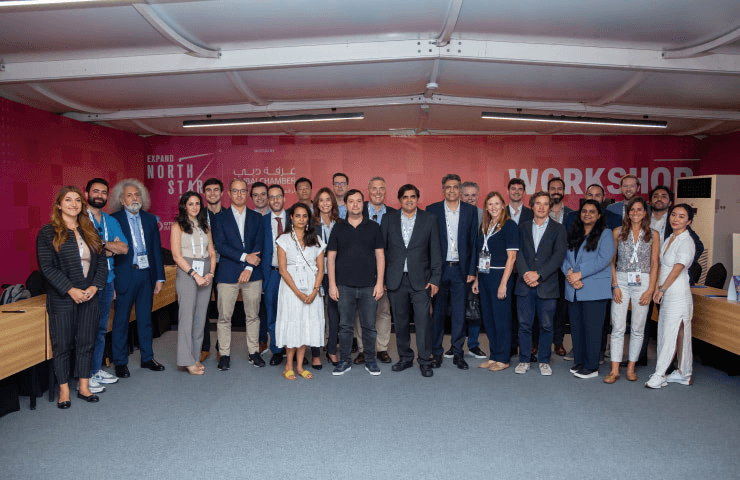IE School of Science and Technology advances virtual assets regulation at the GITEX Future Blockchain Summit in Dubai

IE School of Science and Technology (IE University) took a leading role in this year's Future Blockchain Summit in Dubai, reinforcing its position at the forefront of global discussions on virtual assets. The IE panels and workshop at Dubai Harbour, part of GITEX GLOBAL, one of the largest Tech and AI event worldwide, gathered industry leaders and innovators in Web 3.0, Blockchain, Crypto, NFT, Metaverse, and Gaming communities, to explore cutting-edge developments in the blockchain space and foster connections between industry, research, and regulation.
As part of its contribution, IE School of Science and Technology hosted the IE Ripple Virtual Asset Regulation Collider, a premier event in partnership with Ripple’s University Blockchain Research Initiative (UBRI) and Dubai Virtual Assets Regulatory Authority (VARA), which brought together regulators, industry leaders, and innovators to discuss and shape the future of virtual asset regulation.
"As digital currencies and blockchain technology become increasingly mainstream, this collider serves as a critical platform for addressing regulatory challenges, exploring global standards, and fostering collaboration between governments and private enterprises," mentioned Ikhlaq Sidhu, Dean of IE School of Science and Technology, who participated as keynote speaker at the event for his expertise leading the IE Ripple Virtual Asset Regulation Lab at the school.
"It’s been amazing to work so closely with Ripple’s UBRI and Dubai’s Virtual Assets Regulatory Agency (VARA) to create a direct connection to the banks, ventures, academics, and policy makers where the fintech and cryptocurrency industry is so exemplary and vibrant. This is essential as we create the next generation of Fintech, Blockchain & XRP programs for real life learning and high-impact research", said Dean Ikhlaq Sidhu.
Dean Ikhlaq Sidhu delivered a keynote address at the summit titled "From Code to Compliance: The Future of Blockchain Regulation and AI Integration." His speech addressed the evolving landscape of blockchain technology, emphasizing the importance of regulatory frameworks that adapt to innovations in both blockchain and artificial intelligence.
Dean Sidhu also moderated the collider discussion on "Virtual Assets Revolution: A 360° View from Regulators, Investors, and Innovators", with Vinit Shah (Senior Advisor, VARA), Michael Ashby (CEO, Algoquant), Talal Tabbaa (CEO, CoinMENA) and Dr. Paolo Tasca (Professor at UCL, London and Founder, DLT Foundation).
"It was an honour to participate in the IE Ripple Virtual Asset Collider and Workshop, where we engaged in insightful discussions on the evolving landscape of virtual assets and the critical role that regulation plays in shaping a secure and innovative ecosystem", emphasized Vinit Shah, Senior Advisor at VARA. "Collaborations with academic institutions like IE are invaluable in advancing our understanding of this rapidly developing field and help us build a more resilient and forward-looking regulatory framework."
The insightful workshop on the "Future of Virtual Asset Regulation," organized by IE School of Science and Technology in Dubai, brought together over 35 experts from industry, academia, and regulatory authorities. It aimed to advance both knowledge and practice in virtual asset regulation. The event was conducted by Luis Maldonado, professor at IE University, and Andrew Whitworth (EUI), and included presentations from the researchers of the IE Ripple Virtual Asset Regulation Lab: Eduardo Castello (Professor of Robotics, IE School of Science and Technology), Álvaro Arenas (Information Systems Area Chair, IE Business School), and Professor Jillian Grennan (Emory University).
Abdallah Mukalled, MEA Senior Policy Manager at Ripple, added: "Developing a thriving virtual assets ecosystem requires effective regulation and broad cross-sector collaboration that can harness rapid innovation. Initiatives like this collider, working with regulators like VARA, do exactly that - helping to transform innovation into blockchain solutions for real-world problems, with the surety of a regulatory umbrella".
Aimed to break silos between academia and industry, IE School of Science and Technology's Impact Xcelerator Lab on Virtual Asset Regulation is a member of Ripple's University Blockchain Research Initiative (UBRI). This program is focused on advancing academic research and innovation in blockchain technology and cryptocurrency. Launched to foster collaboration between Ripple and leading universities worldwide, the initiative prepares students to be at the forefront of the evolving digital economy, equipping them with the knowledge and skills needed to navigate and shape the future of finance and technology.
To conclude, there was a networking night with IE University alumni, event participants, and special guests. The evening provided an opportunity to further explore the day's topics, while enjoying the views of Dubai Harbour.

